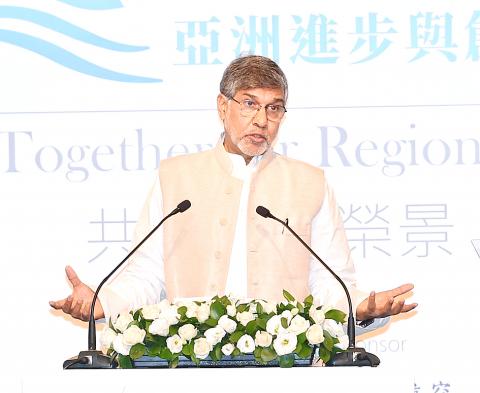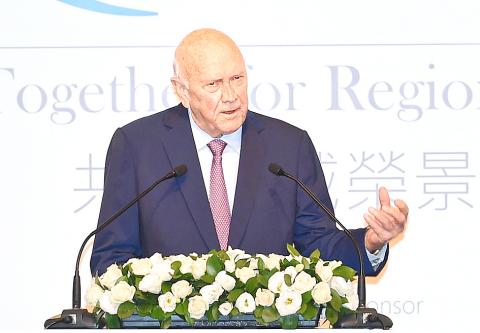Nobel Peace Prize laureate Kailash Satyarthi yesterday applauded Taiwan-led initiatives to engage and empower younger generations to make positive changes.
In a keynote address to the Yushan Forum in Taipei, the Indian laureate said respecting the voices of young people is an important way to find solutions to the many problems afflicting humanity.
“Today I would urge you to prioritize developing our children and young people in the world. No sustainable change, no sustainable peace, no sustainable prosperity is possible without respecting young people in the world,” he said.

Photo: Fang Pin-chao, Taipei Times
Satyarthi, the founder of the Bachpan Bachao Andolan (Save Childhood Movement), which campaigns for the rights of children, shared the 2014 Nobel Peace Prize with then-Pakistani teenager Malala Yousafzai.
Taiwan is like his “second home,” because he has hundreds of “children” who live here, he said, referring both to his second visit to the Taipei and to the Taiwanese volunteers who have worked over the past 10 years at Bal Ashram, his group’s rehabilitation and training center, which caters to the special needs of child labor victims.
Taiwan sends the largest number of volunteers for human services and support in Africa, Asia and other countries around the world in terms of the percentage of population, he said.

Photo: Fang Pin-chao, Taipei Times
“Though Taiwan is a small country, people have a big heart,” he said.
He hailed President Tsai Ing-wen (蔡英文) for her New Southbound policy, adding: “When everybody looks at the North and the West, you have that leadership that looks southbound. Thanks for that.”
The Yushan Forum was inaugurated in October last year as a platform to promote cooperation among nations targeted by the New Southbound policy. This year’s two-day meeting is focused on engagement among young leaders in the region.
Another Nobel peace laureate, former South African president F.W. de Klerk, discussed the role of leaders in guiding change and innovation.
Instead of listening to what the people want and then giving it to them, “the real challenge for real leadership is to convince people what is best for them,” even if achieving that goal might take some sacrifices, he told the forum.
In the long run, the vision would benefit them and, more importantly, the next generation, he said.
After identifying the need, the next challenge for a leader is to formulate a concise goal before convincing his or her voters to back it up, he said.
Taking his country as an example, he said South Africa and its people “were caught up in the downward spiral of violence and continuing repression” in the 1980s.”
“We were in the wrong place. We had to admit to ourselves that where we stood is morally indefensible and therefore we have to change fundamentally,” he said.
US Environmental Protection Agency Principal Deputy Assistant administrator Jane Nishida told the forum that Taiwan’s contributions to environmental protection is a source of inspiration for countries in the region.
Taiwan has made great progress in tackling environmental issues over the past 20 years, including water and air pollution and electronic waste management, Nishida said.
Countries around Asia have been drawn to Taiwan’s example, which is being shared under the International Environmental Partnership, a longtime collaboration between her agency and the Environmental Protection Administration, she said.
“Taiwan has now become a leader in environmental protection and a true global example,” she said.

ANOTHER EMERGES: The CWA yesterday said this year’s fourth storm of the typhoon season had formed in the South China Sea, but was not expected to affect Taiwan Tropical Storm Gaemi has intensified slightly as it heads toward Taiwan, where it is expected to affect the country in the coming days, the Central Weather Administration (CWA) said yesterday. As of 8am yesterday, the 120km-radius storm was 800km southeast of Oluanpi (鵝鑾鼻), Taiwan’s southernmost tip, moving at 9kph northwest, the agency said. A sea warning for Gaemi could be issued tonight at the earliest, it said, adding that the storm is projected to be closest to Taiwan on Wednesday or Thursday. Gaemi’s potential effect on Taiwan remains unclear, as that would depend on its direction, radius and intensity, forecasters said. Former Weather Forecast

As COVID-19 cases in Japan have been increasing for 10 consecutive weeks, people should get vaccinated before visiting the nation, the Centers for Disease Control (CDC) said. The centers reported 773 hospitalizations and 124 deaths related to COVID-19 in Taiwan last week. CDC Epidemic Intelligence Center Director Guo Hung-wei (郭宏偉) on Tuesday said the number of weekly COVID-19 cases reported in Japan has been increasing since mid-May and surpassed 55,000 cases from July 8 to July 14. The average number of COVID-19 patients at Japan’s healthcare facilities that week was also 1.39 times that of the week before and KP.3 is the dominant

The Chinese Communist Party’s (CCP) working group for Taiwan-related policies is likely to be upgraded to a committee-level body, a report commissioned by the Mainland Affairs Council (MAC) said. As Chinese President Xi Jinping (習近平) is increasingly likely to upgrade the CCP’s Central Leading Group for Taiwan Affairs, Taiwanese authorities should prepare by researching Xi and the CCP, the report said. At the third plenary session of the 20th Central Committee of the CCP, which ended on Thursday last week, the party set a target of 2029 for the completion of some tasks, meaning that Xi is likely preparing to

US-CHINA TRADE DISPUTE: Despite Beijing’s offer of preferential treatment, the lure of China has dimmed as Taiwanese and international investors move out Japan and the US have become the favored destinations for Taiwanese graduates as China’s attraction has waned over the years, the Ministry of Labor said. According to the ministry’s latest income and employment advisory published this month, 3,215 Taiwanese university graduates from the class of 2020 went to Japan, surpassing for the first time the 2,881 graduates who went to China. A total of 2,300 graduates from the class of 2021 went to the US, compared with the 2,262 who went to China, the document showed. The trend continued for the class of 2023, of whom 1,460 went to Japan, 1,334 went to